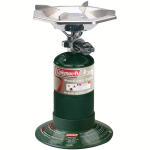Copper designed to be used in gas lines is heavier than regular household waterline copper and when proper gas line copper is bent and installed correctly, it will last the life of the project. Because of the thicker walls, It is a little bit harder to work with than it's thinner water line cousin but when it is tethered along its run to a wall or other solid surface with a purpose designed rubber lined clamp, it is bomber and it is highly unlikely that it will suffer any ill effects from vibration.
I agree with Pntyrmvr on both using copper over hose and using proper flared joints as opposed to compression fittings.
As far as "no connections inside the living area", I think Pnyrmvr may have been referring to doing connections (for example with a "T") within the living space for the purpose of running branches to service more than one appliance from a single gas line. The code (at least in these parts anyway) is that each appliance should have its own dedicated gas line, each of which starts at the manifold (assuming more than one appliance) that is enclosed within the sealed (or isolated) tank locker. Following this rule, the only actual connection within the living space will then be to the actual appliance.
Buy a good quality flaring tool and start practicing. When you consistently get 9/10 keepers, you are pretty much there!!

